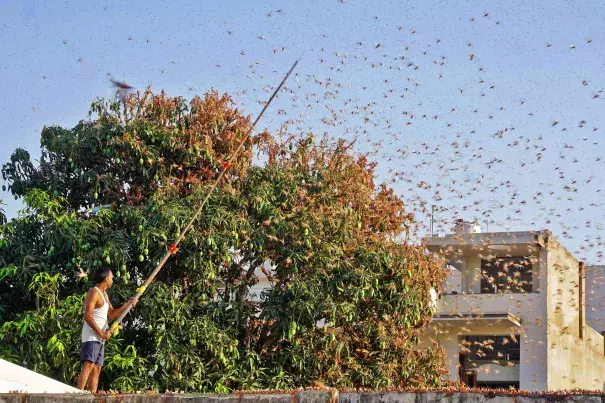‘Overtaken by Aliens’: India Faces Another Plague as Locusts Swarm

Climate Signals Summary: Climate change is making extreme rainfall more common, which creates the perfect breeding conditions for desert locusts, like the recent outbreak in East Africa.
Article Excerpt: Magan Doodi, a groundskeeper at a golf course in Jaipur, was making his rounds earlier this week when he saw the sky suddenly turn a weird pink.
It wasn’t some quirk of the weather. It was locusts — millions of them, “like a spreading bedsheet,” he said.
“The locusts have attacked the golf course!” Mr. Doodi yelled into his cellphone during the battle Monday morning. “It’s man versus locusts!”
As if India needed more challenges, with coronavirus infections steadily increasing, a heat wave hitting the capital, and 100 million people out of work, the country now has to fight off a new problem: a locust invasion.
...
On Monday, Jaipur, a sprawling city of 4 million and the biggest in the state of Rajasthan, was besieged. A blizzard of bugs flew over concrete buildings and the wealthier neighborhoods, swooping in on trees and plants, crossing graveyards and jewelry markets, attracted to the manicured golf course in the heart of the city.
...
“I got out of my room and came out on my terrace at around 10 a.m. and saw a long shadow on the ground,” recalled Nikhil Misra, a lawyer in Jaipur. “I just stood still. It was something I had never seen in my lifetime.”
“I looked up and saw a cloud, not the cloud that gives you rainfall, but a cloud of locusts, thousands and thousands of them hovering over my head,” he said. “It was a silent attack. It was a strange kind of fear, as if being overtaken by aliens.”
Scientists say that this outbreak, though separate from recent outbreaks in East Africa, is driven by the same factors: unusually warm weather and more rain. They blame climate change.
“All this started in late 2019, when there were warm waters in the western Indian oceans,” said Roxy Mathew Koll, a climate scientist at the Indian Institute of Tropical Meteorology in Pune. “These waters triggered lot of rains over the East African regions and the Arabian Peninsula. This seems to have triggered an ideal condition for breeding of locusts.”


